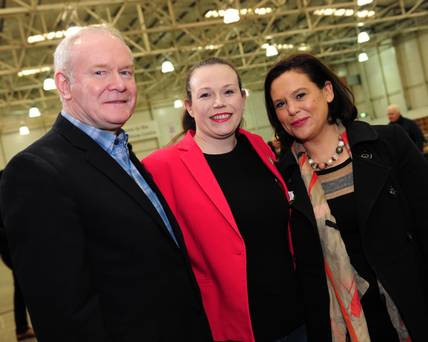As a Republican and a parliamentarian, I am particularly proud of Ireland’s unmanageable revolutionaries.
These brave women from across the political and class divide fought fearlessly and furiously against a harsh and hateful patriarchal power.They were pilloried, they were beaten and for many, worst of all, they were dismissed.
Some weeks back we marked the 150th anniversary of Countess Markievicz’s birth – a woman who embodied the boldness of Republican and socialist demands for a free and equal Ireland.
Constance threw off the “old idea that a woman can only serve her nation through her home” and challenged women across class and generation to dedicate themselves to the cause of freedom and equality with a rallying cry that “now is the time, and on you the responsibility rests”.
It is important to acknowledge the depth of opposition to women’s suffrage to fully appreciate the demand the Countess made of Irish women at that time.In 1912 the deputy leader of the Irish Parliamentary Party told a deputation of Irish suffragettes that: “Women’s suffrage will, I believe, be the ruin of our Western civilisation. It will destroy the home, challenging the headship of man, laid down by God.”
And challenge the headship of man they did. One hundred years ago the Representation of the People Act was passed and women over the age of 30 who met a property qualification were granted the vote.
One hundred years ago the Representation of the People Act was passed and women over the age of 30 who met a property qualification were granted the vote.
It was not universal suffrage, but the dam was irretrievably broken. Women’s demands for votes were set against – and for many Republicans intrinsically linked with – the cause of Irish freedom and fight for workers’ rights.
Countess Markievicz told the Dáil in 1922 that she stood for the “Workers Republic for which Connolly died”, and a “state run by the Irish people for the people”. Internationalism was also a common cause among many Republican and Nationalist women activists.
Louie Bennett, co-founder of the Irish Women’s Suffrage Federation, emphasised the internationalism of Irish feminism when she said, “we suffragists are working for all women… We recognise the bond of sisterhood uniting women of every nationality without losing anything of the strong, free, Celtic spirit and passionate instinct for independence characteristic of that spirit”.
Whilst Bennett and Markievicz would not have agreed on the method by which independence would be achieved, they both valued the support of their male comrades. Bennett, as Secretary of the Irish Women’s Workers Union, described Connolly as “…one of the best suffrage speakers I have ever heard and a thorough feminist in every respect…”
The common thread from their time to ours is the demand for rights – very basic rights. In 1918 women and men were fighting for language rights, democratic rights, equality and independence. We can and should make the direct link between the demands of Markievicz and Bennett to today’s campaigns for Irish language rights and marriage equality in the north.
We cannot celebrate the achievements of these two women and then ignore the demands for an Irish Language Act and same sex civil marriage from their fellow country women and men. If Markievicz and Bennett could extend their solidarity across the class, gender and nation divide, surely the best way that we in this institution can honour them is to extend our solidarity to those on our shared island who have yet to secure the rights we all enjoy today.
Similarly, I cannot let the opportunity pass without reflecting on the historic injustice Irish women have suffered due to the eighth amendment. The repeal of the eighth amendment is absolutely necessary in order to ensure that Irish women have access to proper and appropriate healthcare.
The eighth amendment should never have been placed in our constitution. It was a mistake, and bitter experience over decades demonstrates this. It was born out of an entirely sexist view of the world and the conservative social values which dominated our society for decades. The power and influence of the Church and its strict, reactionary doctrine was central to that theocratic system.
The insertion of the eighth amendment into the constitution in 1983 was an extension of this system. In order for that Ireland to be gone, the eighth amendment must go. Its removal will free women and their doctors to make decisions without the fear of prosecution and prison. Women should be trusted to make decisions about their own bodies and medical needs. This referendum provides us with a historic opportunity to finally ensure that compassion and trust in women prevails.
The eighth amendment is a relic of an Ireland of the past, yet it restricts the rights of women in the here and now and affects our future in such a profound way. It has to go.
Irish women have always fought for rights, from the right to vote, to the right to access to contraception, to the upcoming fight for the removal of the eighth amendment from the constitution.
Irish women have always fought for rights, from the right to vote, to the right to access to contraception, to the upcoming fight for the removal of the eighth amendment from the constitution. Oftentimes we look back and talk about the revolutionaries of the past, but when I looked out last month at the rally for repeal I saw many young, unmanageable revolutionaries in black repeal jumpers who will make history of their own.
Louise O’Reilly is a Sinn Féin TD.







